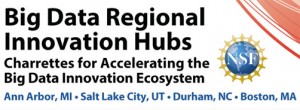 The National Science Foundation (NSF) has recently announced a new program solicitation for the Big Data Regional Innovation Hubs: Establishing Spokes to Advance Big Data Applications (BD Spokes). The original award gave $10 million to 10 BD Spokes projects in order to facilitate research of key topics selected by the by the four Big Data Regional Innovation Hubs (BD Hubs).
The National Science Foundation (NSF) has recently announced a new program solicitation for the Big Data Regional Innovation Hubs: Establishing Spokes to Advance Big Data Applications (BD Spokes). The original award gave $10 million to 10 BD Spokes projects in order to facilitate research of key topics selected by the by the four Big Data Regional Innovation Hubs (BD Hubs).
This solicitation calls for an estimated 10 to 20 new BD Spoke proposals to be funded in 2018 in collaboration with the BD Hubs. Each project will be categorized as Small – funded at $100,000 to $500,000 for up to three years – or Medium – funded at over $500,00 up to $1,000,000 for up to three years.
The Big Data activities of a BD Spoke will be guided by the following broad themes:
- Accelerating progress towards addressing societal grand challenges relevant to the regional and national priority areas defined by the BD Hubs (information on priority areas can be found on each Hub’s website listed in the Introduction section below);
- Helping automate the Big Data lifecycle; and
- Enabling access to and spurring the use of important and valuable available data assets, including international data sets where relevant.
Currently, the Spokes cover a wide variety of big data related activities, including:
- The use of big data for computational neuroscience;
- Data science application in agriculture and in the use unmanned aircraft systems (UAS) for plant sciences, phenomics, and genomics;
- The acquisition and use health data, analytics, and precision medicine.
- Data-driven approaches to education;
- Increasing reproducibility in scientific computation and data synthesis through cyberinfrastructure and community development;
- And the analysis of coastal hazards with big data;
The deadline for submitting a Spoke proposal is September 18, 2017. Learn more about the new Spokes solicitation at the NSF’s full announcement.
In 2016, the Computing Community Consortium (CCC) sponsored the BD Hubs for an Industry-Academic Collaboration program. Featured activities included workshops, faculty internships, student internships, site visits, hackathons, and lecture series. Learn more about the CCC’s viewpoint on industry-academic collaboration in The Future of Computing Research: Industry-Academic Collaborations white paper.









